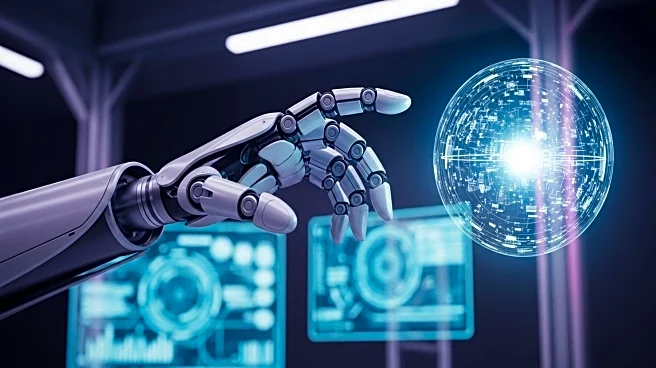What is the story about?
What's Happening?
Google DeepMind has introduced Gemini Robotics 1.5, a new vision-language-action (VLA) model aimed at improving robots' ability to perform complex, multi-step tasks with increased autonomy and transparency. This launch includes two models: Gemini Robotics 1.5 and Gemini Robotics-ER 1.5. The former is DeepMind's most advanced VLA system, capable of converting visual inputs and instructions into motor commands, while the latter acts as an embodied reasoning model, orchestrating high-level planning and logical decision-making. These models are designed to work together, with Gemini Robotics-ER 1.5 generating plans and instructions, and Gemini Robotics 1.5 executing them by translating language and vision into physical actions. This collaboration aims to enhance robots' generalization capabilities across diverse environments and longer tasks. DeepMind emphasizes the importance of safety in developing embodied AI, incorporating semantic reasoning and collision-avoidance subsystems into the models.
Why It's Important?
The launch of Gemini Robotics 1.5 marks a significant advancement in the field of robotics and artificial intelligence, as it moves beyond reactive systems towards solving artificial general intelligence (AGI) in the physical world. This development has the potential to revolutionize industries reliant on automation and robotics, such as manufacturing, logistics, and healthcare, by enabling robots to perform more complex tasks with greater efficiency and adaptability. The integration of reasoning and planning capabilities in robots could lead to improved operational safety and productivity, benefiting businesses and consumers alike. Furthermore, the ability to transfer skills across different robot embodiments could reduce costs and increase flexibility in deploying robotic solutions across various sectors.
What's Next?
DeepMind has made Gemini Robotics-ER 1.5 available to developers through the Gemini API in Google AI Studio, with Gemini Robotics 1.5 initially offered to select partners. This strategic rollout suggests a focus on collaboration with industry leaders to refine and expand the application of these models. As developers begin to integrate these models into their systems, we can expect advancements in robotic capabilities and potential new use cases to emerge. Stakeholders in industries such as manufacturing and logistics may explore partnerships with DeepMind to leverage these technologies for enhanced automation solutions. Additionally, ongoing updates and improvements to the models' safety and reasoning capabilities are likely as DeepMind continues to test and refine its technology.
Beyond the Headlines
The introduction of Gemini Robotics 1.5 raises important ethical and cultural considerations regarding the role of AI in society. As robots become more autonomous and capable of reasoning, questions about accountability, transparency, and the impact on employment arise. Ensuring that AI systems align with societal values and safety standards is crucial to gaining public trust and acceptance. Moreover, the ability of robots to 'think before acting' and transfer skills across embodiments could lead to long-term shifts in how industries approach automation, potentially redefining job roles and skill requirements. These developments underscore the need for ongoing dialogue and regulation to address the ethical implications of advanced AI technologies.















